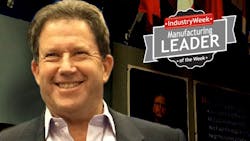Bringing Bikes (and Jobs, and Manufacturing) Back to the US
ROSEMONT, Illinois — Arnold Kamler wants to build bicycles in the United States, just like his father. He wants to sell them here, too, just like his grandfather. And even more important, he wants to employ as many Americans as he can to help him.
Kamler is the chairman and CEO of Kent International, Inc. & Bicycle Corporation of America, which manufactures millions of bicycles every year, a high-volume supplier to retailers like Walmart, Toys“R”Us and Target. The company tracks back almost 70 years, when Kamler’s father, Philip, branched out from selling bikes to supplying them, and has grown ever since. Kent has its roots in New Jersey, and today has a significant footprint in South Carolina.
The path to get there, though, was not necessarily direct.
From the late 1970s, through the ’80s and into the early ’90s, “We made in the U.S. all of our own frames, we made handlebars, we made chain wheels, and then we sourced the other parts,” Kamler said during a keynote at the Manufacturing & Technology Conference & Expo. The company was manufacturing about 250,000 bicycles and importing another 800,000 every year, and “life was good.
“But then China came on the scene, and we had no choice but to move our import business to China and, then under great pressure from my bank in 1991,” move manufacturing out of the country altogether, Kamler said, in order to cut the then-five-dollar loss incurred on every bicycle made in New Jersey.
“It was heartbreaking. I love manufacturing. We had more than 200 workers and I think I knew everyone by name.”
Kent was hardly alone. Huffy, Murray, Roadmaster and Schwinn all struggled after courts ruled in 1996 that mass-market Chinese imports posed no material threat to the American companies. Unlike those other brand names, which have largely been been sold off during the last several decades, Kent has restructured and re-strengthened.
First, Kamler developed a working relationship with a smaller Chinese company called Shanghai General Sports, increasing annual imports to more than 2 million bicycles, then he brokered an ownership deal with them, selling 49% of the company, a working partnership. That allowed him to start thinking about manufacturing here again, about reshoring. Good timing: In 2013, he received a call from the lead bicycle purchaser for Walmart, who put him in touch with South Carolina governor Nikki Haley.
“‘Arnold,’” Kamler said Haley told him, “‘we make airplanes in South Carolina, we make cars in South Carolina, we make tires in South Carolina, and I want to be able to tell the kids we make bicycles in South Carolina.’”
Kamler looked at setting up a new factory in several other states, but ultimately returned to South Carolina — direct contact with the governor helped, as did a good labor force, a proper building and a location within 75 miles of a major ocean seaport for export to Europe. After ironing out details and some state incentives, he opened a new factory in Manning, located between Columbia and the coast, in the fall of 2014.
“There are tremendous advantages now to doing business in the United States in our low-technology industry that did not exist before,” Kamler said. The cost of energy, for instance, is about 40% in South Carolina of what the same amount would cost now in China, and labor costs on the other side of the Pacific is increasing about 10% annually and turnover is constant.
In South Carolina, the headcount of about 100 has next to no turnover and is expected to increase to 175 or even double to 200 by the end of the company’s current four-year cycle in late 2017. The number of bicycles manufactured here is on a similar trajectory, around 275,000 now, with plans to bump up to half a million next year and ultimately increase to 1 million domestically-made bikes by 2020.
“Our goal is not to eliminate our import business,” Kamler said, noting that even after the company hits that 1 million mark, more than 60% of its bikes will still be made overseas, “but to have our growth fueled by American manufacturing.”
Kamler received a handful of spontaneous ovations from a room filled with manufacturing execs and C-suiters — for his nearly-40-year marriage to his wife, Gayle, for his efforts to bring back jobs and manufacturing to the United States, for his success. Will he hit that 1 million mark within the next four years?
“2020 is a long time from now,” Kamler said. “I might even be retired by then. You just don’t know.”
But the plan, at least, is in place.
About the Author
Matt LaWell
Staff Writer
Staff writer Matt LaWell explores news in manufacturing technology, covering the trends and developments in automation, robotics, digital tools and emerging technologies. He also reports on the best practices of the most successful high tech companies, including computer, electronics, and industrial machinery and equipment manufacturers.
Matt joined IndustryWeek in 2015 after six years at newspapers and magazines in West Virginia, North Carolina and Ohio, a season on the road with his wife writing about America and minor league baseball, and three years running a small business. He received his bachelor's degree in magazine journalism from Ohio University.

